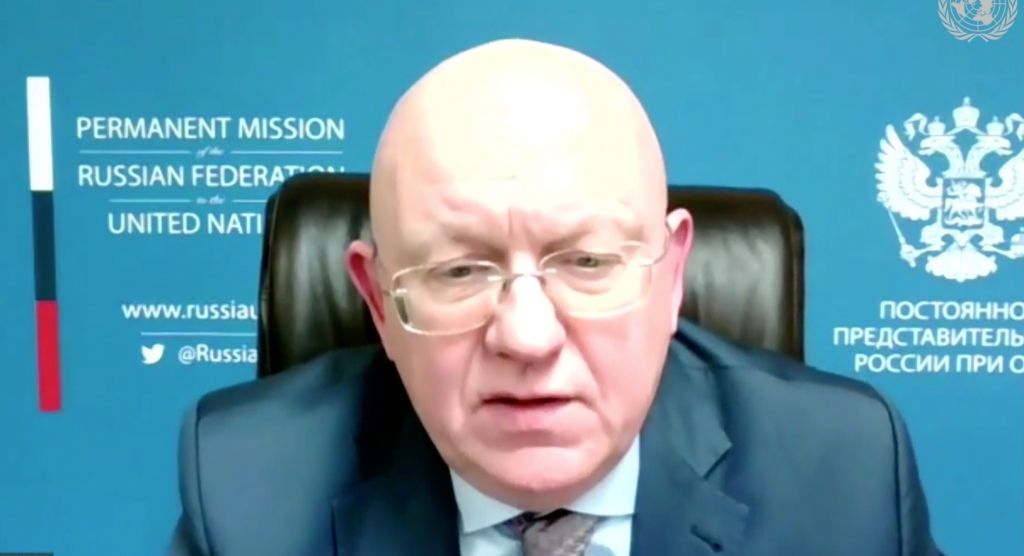Statement by Vassily Nebenzia, Permanent Representative of Russia to the United Nations at the UN SC Members Arria Formula meeting “Upholding the collective security of the UN Charter: the use of force in international law, non-state actors and legitimate self-defense”
Mr. Chairman,
Let me first of all express gratitude to the Permanent Mission of Mexico for organizing this important discussion. I would also like to thank Professor Modirzadeh for her briefing.
In recent years we have witnessed an unprecedented proliferation of notifications to the Security Council under article 51 regarding the use of force allegedly in self-defense by a number of States against terrorists on the territories of Syria and Iraq. At the same time we also saw a number of responses mostly from the Government of Syria, which strongly deny the qualifications used in these notifications and describe the actions of relevant States in terms of aggression, occupation and other forms of illegal use of force. We also know what happens on the ground and have a chance to compare the situation with the language of notifications, which too often do not coincide.
This situation became an elephant in the chamber of the Security Council that nobody wished to notice. So we congratulate Mexico for its courage to put this elephant in the limelight.
The issue of the use of article 51 against non-state actors is a difficult one, because this article was not intended for this purpose. We must recognize that. It was drafted in order to describe the right of self-defense against armed attacks of States. However the language of this article allows for a broader interpretation. This broader interpretation became practical after 9/11, which demonstrated that an attack of terrorists may rise to the level of an armed attack of a State. It was confirmed in the SC resolution 1368 (2001).
However, it does not mean that any terrorist attack in a cross border context gives rise to the right of self-defense. Firstly, the criteria applicable to the definition of an armed attack must be fulfilled, in particular in terms of the magnitude of the event. Secondly, the position of the government of a State from whose territory terrorists strike must be carefully assessed. It is one thing when a government directs and supports such an attack and another if it uses all available means to fight such terrorists and is open for cooperation with other States. In the latter case it is obvious that cooperation and consent of the government must be requested. The level of bilateral relations or lack thereof may not be the ground for avoiding this requirement.
Going back to the recent notifications circulated in the Council regarding the use of force by a number of States on the territory of Syria, we would highlight a couple of points.
There is no Security Council resolution authorizing the use of force on the territory of Syria. In their notifications States refer to collective self-defense of Iraq against ISIL as the legal basis for their actions. However, Iraq itself did not claim self-defense against ISIL on the territory of Syria. Indeed it has asked for assistance in the fight against this terrorist organization, but it did not specify that such assistance should take the form of the use of force on the territory of Syria. Secondly, the Government of Syria is fighting ISIL by all available means. In this regard we do not see any legal ground not to seek for the Government’s permission for the use of force on its territory or not to coordinate the efforts. This is even more relevant in light of the fact that Syria offered cooperation to all States in the fight against ISIL. Thirdly, and even more significantly, armed activities by a number of States on the territory of Syria go far beyond any action, which maybe qualified as self-defense against ISIL. We observe use of force directed against Syrian army or in support of armed groups who oppose the Government and even occupation of parts of the territory of Syria, in particular for the purposes of denying access to oil fields on the territory of the State to its own Government while providing this access to opposing armed groups.
In this regard, we would like to emphasize that circulation of article 51 notifications in the Security Council and the lack of immediate reactions from States does not and should not mean that actions taken in accordance with them gained legality or that such conduct contributes to the formation of a new norm of law.
The legal architecture of collective security, of which article 51 is a part, is the highest achievement of contemporary legal order based on the UN Charter and nobody should be abusing it.
